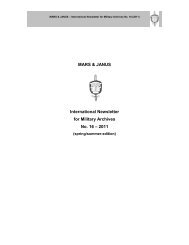National Experiences - British Commission for Military History
National Experiences - British Commission for Military History
National Experiences - British Commission for Military History
You also want an ePaper? Increase the reach of your titles
YUMPU automatically turns print PDFs into web optimized ePapers that Google loves.
60 ai r p o w e r in 20 t H Ce n t u ry do C t r i n e s a n d em p l o y m e n t - nat i o n a l ex p e r i e n C e s<br />
the contemporary doctrine linking the operational peacetime principles of peacetime<br />
training and wartime action, as the Royal Air Force War Manual published in 1950,<br />
the contemporary doctrine of the Royal Air Force, put the matter. 4<br />
The article focuses almost entirely on the <strong>British</strong> part of the operation. The French<br />
participation is consciously left on the sidetrack, but not because their participation<br />
is uninteresting. On the contrary, the French possessed some extremely exiting<br />
and modern concepts worth of further research such as airborne and psychological<br />
operations or tactical employment of ultra modern 7 Division Mécanique Rapide.<br />
However, L’Armée de l’Air did not have a doctrine or the resources to conduct<br />
strategic air operations that are the main focus of this article.<br />
Strike Hard, Strike Sure – the Principles of <strong>British</strong> Air Power<br />
“Allied Air Power was decisive in the war in Western Europe. Hindsight inevitably<br />
suggests that it might have been employed differently or better in some respects.<br />
Nevertheless it was decisive” 5<br />
It is no coincidence that John Slessor, Marshal of the Royal Air Force, a <strong>for</strong>mer<br />
Chief of Air Staff and a well known protagonist of air power, quoted the United<br />
States Strategic Bombing Survey in his 1954 book Strategy <strong>for</strong> the West. In the<br />
absence of missiles, Britain’s <strong>for</strong>thcoming nuclear deterrence was to be based on the<br />
Royal Air Force. The RAF was to become the primary arm since it was to deliver<br />
Britain’s nuclear inventory if deterrence failed.<br />
During the Suez Crisis, air power was to play a predominant role in the Allied<br />
attack plans. To understand the background <strong>for</strong> the decisions made in these plans, it is<br />
relevant to review the ideas of aerial warfare that prevailed at the time in the United<br />
Kingdom. The tactics introduced during the Second World War still prevailed in the<br />
<strong>British</strong> Army. But did the lessons of the war provide an empirical basis also <strong>for</strong> the<br />
Royal Air Force in the mid-1950s? Had the role of air <strong>for</strong>ces changed since the Second<br />
World War? What were the principles of applying air power in a Limited War?<br />
The basic foundations of the air <strong>for</strong>ce doctrine originated from a holistic<br />
understanding of a country’s capacity to wage war. According to the Royal Air Force<br />
War Manual, the war potential of the enemy consisted of various factors such as<br />
the armed <strong>for</strong>ces, morale, industrial and economic capacity, scientific research and<br />
manpower. Most of the physical manifestations of these factors were located inside<br />
enemy territory. This led to the logical conclusion that “the basic weapon of the air<br />
<strong>for</strong>ce is the bomber and the basic strategy of Air Power must be offensive”. 6<br />
4 Royal Air Force War Manual, Operations (AP 1300, 1950), introduction.<br />
5 John Slessor, Strategy <strong>for</strong> the West (London: Cassell & Co, 1954), p. 96. Originally quoted in the<br />
United States Strategic Bombing Survey, Over-all Report (European War), September 30, 1945,<br />
(Washington D.C: U.S. Government Printing Office, 1945), p. 107.<br />
6 Royal Air Force War Manual, Part 1, Operations (Air Ministry, 1950), pp. 2-5, 19.



